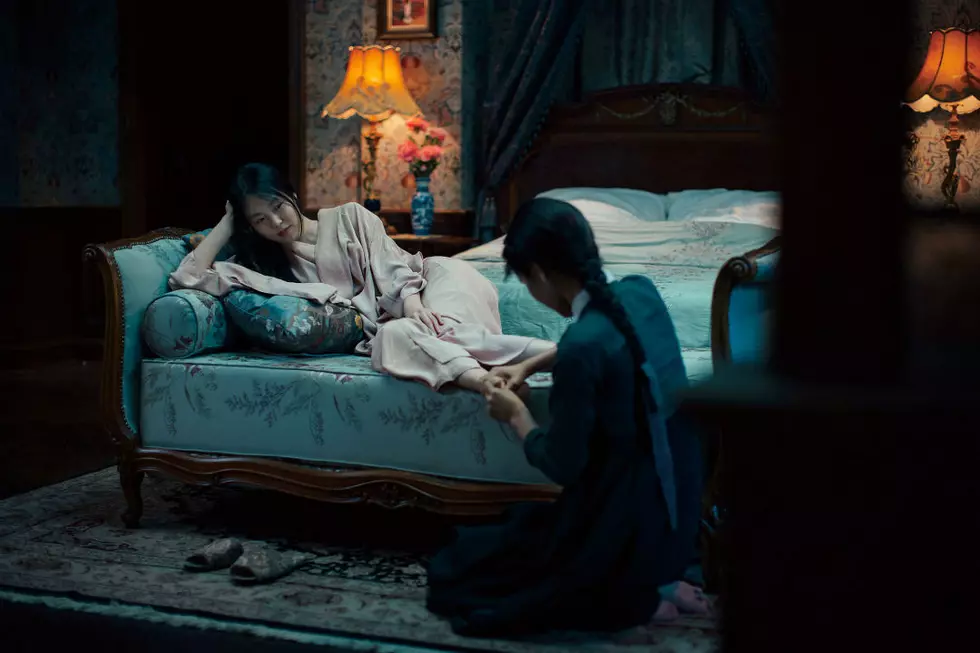
‘The Handmaiden’ Review: Park Chan-wook Delivers a Delicately Twisted Masterpiece
After making his English-language debut with Stoker, Park Chan-wook returns to his native South Korea for The Handmaiden, a gloriously sensual and impressively layered thriller that’s every bit as Hitchcockian and gothic as its predecessor. In a brilliantly repurposed adaptation of Sarah Waters’ Fingersmith, Park changes the setting of the story from Victorian England to Colonial-era Korea, which serves as a nuanced backdrop for his greatest masterpiece to date.
Like Waters’ novel, The Handmaiden is structured in three acts, each exposing a new layer of perspective that enriches the complexity of its characters while advancing their stories to increasingly devious and wonderful depths. In a remote estate that curiously combines the architecture of Japan and England to uncanny results lives a Japanese heiress named Hideko (Kim Min-hee), who spends much of her time performing readings for a sadistic uncle who plans to use her inheritance to increase his literary collection. Enter Count Fujiwara (Ha Jung-woo), a narcissistic Korean con man who employs clever pickpocket Sook-hee (Kim Tae-ri) to pose as Hideko’s new handmaiden in an elaborate scheme to defraud the elusive heiress.
It’s a complex plot executed with elegant precision by Park, who wields his story with the determined delicacy of a corkscrew. The Handmaiden doesn’t hinge on shocking plot twists, nor is it a revenge film in the conventional sense. Here the concept of revenge is subtle metaphor, with Korean characters occupying the territory of those who have invaded them. Occupation and invasion become fluid thematic concepts; the boundaries between Korea and Japan as nebulously defined as those between Sook-hee and Hideko.
The structure of The Handmaiden reflects that of a typical relationship: There are three sides to every story. We begin from the perspective of Sook-hee, the orphaned daughter of a shrewd pickpocket who inherited her mother’s skills. Though somewhat limited by her naïveté, Sook-hee relates to the similarly orphaned Hideko, who inherited a sizable fortune — and the burden of performing for her uncle and his clients. Both women have been exploited by a system: Sook-hee is used as a tool, a hairpin easily slipped into a lock and manipulated until the mechanism gives way; Hideko has been transformed into an unattainable object of desire who exists purely for male enjoyment. She is, essentially, a living and breathing piece of pornographic literature, intended to titillate by conjuring lurid images, but never meant to fully satisfy anyone.
Watching their relationship blossom in defiance of a patriarchal institution that is still sadly, universally relevant, is both joyful and riveting. It’s impossible to watch a Park Chan-wook film and not feel some sense of underlying dread, but despite the more harrowing aspects of Hideko’s past or the insidious designs of the men in their midst, there is an undeniable sense of optimism.
Perhaps the most surprising turn in The Handmaiden is that Park has knowingly subverted his own iconography by delivering one of the most beautifully romantic films of the year. Unlike the vaguely uncomfortable male gaze of Blue Is the Warmest Color, the sex scene between Sook-hee and Hideko is split between a self-awareness of inherent, irrefutable maleness and a respectful sensitivity in which the most graphic image is some residual moisture on Sook-hee’s face. Park seems keenly aware that this scene cannot transcend his gender, and rather than film it as if he has somehow evolved past that dichotomy, he embraces it. There’s also a certain playfulness between the two women in this scene, lending it a sense of realism that was lacking from Blue Is the Warmest Color, which transformed its famous sex sequence into a monotonous endurance test featuring a series of uncanny configurations.
Much attention will be paid to this scene in The Handmaiden, which is repurposed for the benefit of perspective in the second act, but so much more should be given to a particularly joyful moment in the library when the concept of love is fully recognized and understood between two people who set about literally and figuratively destroying a patriarchal institution and all of its prohibitive, exploitative mechanisms. It is a moment of pure, rapturously cathartic feminism — the Colonial-era Korean version of setting some vile man’s belongings on fire and walking away, the ultimate female revenge fantasy.
More From ScreenCrush









